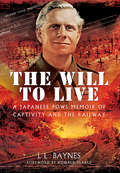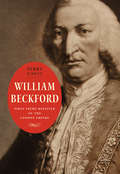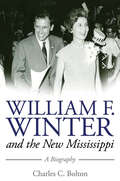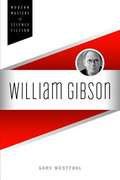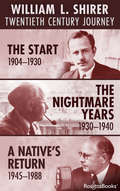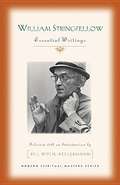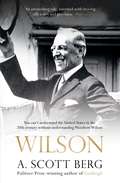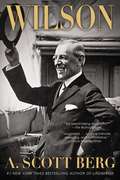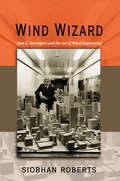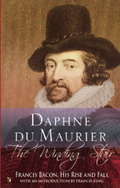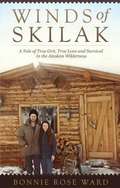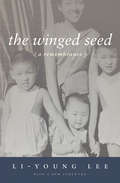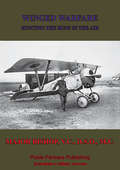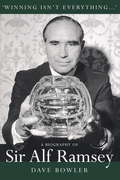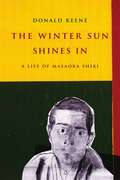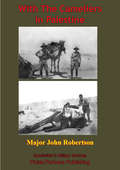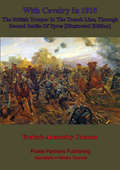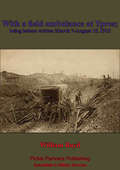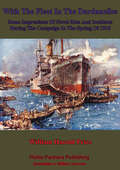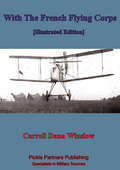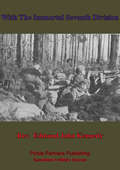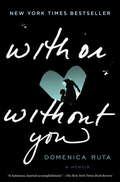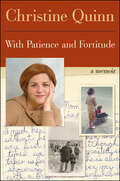- Table View
- List View
The Will to Live: A Japanese POWs Memoir of Captivity and the Railway
by L.L. BaynesThe Author kept a diary recording his 1,000 days of captivity at the hands of the Japanese army. The difficulties and risks involved in this task were immense, yet he persevered although it meant deliberately defacing and cutting up the small pieces of paper. As a result, his memoir is both contemporaneous and entirely reliable.Reading this account of life and death during the fruitless fighting and his subsequent captivity in numerous camps in Singapore and on the Death Railway in Thailand is a humbling and moving experience. He describes not just the appalling hardship and brutality but, tellingly, his relationships with fellow POWs, his captors and the local population. As an NCO, Len found himself fronting up for his men and, being a self-sufficient man with strong beliefs, this led to some difficult situations, at times, with both the Japanese and his British superiors. While critical about a number of the latter, he has nothing but respect for others such as the legendary Colonel Toosey of Tamarkan Camp.Thanks to his honest and direct style, The Will To Live is a fine and inspiring firsthand example of the ever popular Japanese POW/Railway of Death genre. It reveals much about the nightmare experiences suffered by the Author and his colleagues and the way they coped under the most adverse conditions. His drawings complement the text and the Foreword by Ronald Searle, also a POW, speaks for itself.
Will You Love Me?
by Cathy GlassLucy was born to a single mother who had been abused and neglected for most of her own childhood. Right from the beginning Lucy's mother couldn't cope, but it wasn't until Lucy reached eight years old that she was finally taken into permanent foster care. By the time Lucy is brought to live with Cathy she is eleven years old and severely distressed after being moved from one foster home to another. Withdrawn, refusing to eat and three years behind in her schooling, it is thought that the damage Lucy has suffered is irreversible. But Cathy and her two children bond with Lucy quickly, and break through to Lucy in a way no-one else has been able to, finally showing her the loving home she never believed existed. Cathy and Lucy believe they were always destined to be mother and daughter - it just took them a little while to find each other.
William Beckford
by Perry GauciThis first-ever biography of William Beckford provides a unique look at eighteenth-century British history from the perspective of the colonies. Even in his own time, Beckford was seen as a metaphor for the dramatic changes occurring during this era. He was born in 1709 into a family of wealthy sugar planters living in Jamaica, when the colonies were still peripheral to Britain. By the time he died in 1770, the colonies loomed large and were considered the source of Britain's growing global power. Beckford grew his fortune in Jamaica, but he spent most of his adult life in London, where he was elected Lord Mayor twice. He was one of the few politicians to have experienced imperial growing pains on both sides of the Atlantic, and his life offers a riveting look at how the expanding empire challenged existing political, social, and cultural norms.
William F. Winter and the New Mississippi: A Biography (Willie Morris Books in Memoir and Biography)
by Charles C. BoltonFor more than six decades, William F. Winter (1923–2020) was one of the most recognizable public figures in Mississippi. His political career spanned the 1940s through the early 1980s, from his initial foray into Mississippi politics as James Eastland's driver during his 1942 campaign for the United States Senate, as state legislator, as state tax collector, as state treasurer, and as lieutenant governor. Winter served as governor of the state of Mississippi from 1980 to 1984. A voice of reason and compromise during the tumultuous civil rights battles, Winter represented the earliest embodiment of the white moderate politicians who emerged throughout the “New South.” His leadership played a pivotal role in ushering in the New Mississippi—a society that moved beyond the racial caste system that had defined life in the state for almost a century after emancipation. In many ways, Winter's story over nine decades was also the story of the evolution of Mississippi in the second half of the twentieth century. Winter remained active in public life after retiring from politics following an unsuccessful U.S. Senate campaign against Thad Cochran in 1984. He worked with a variety of organizations to champion issues that were central to his vision of how to advance the interests of his native state and the South as a whole. Improving the economy, upgrading the educational system, and facilitating racial reconciliation were goals he pursued with passion. The first biography of this pivotal figure, William F. Winter and the New Mississippi traces his life and influences from boyhood days in Grenada County, through his service in World War II, and through his long career serving Mississippi.
William Gibson (Modern Masters of Science Fiction)
by Gary WestfahlThe leading figure in the development of cyberpunk, William Gibson (born in 1948) crafted works in which isolated humans explored near-future worlds of ubiquitous and intrusive computer technology and cybernetics. This volume is the first comprehensive examination of the award-winning author of the seminal novel Neuromancer (and the other books in the Sprawl trilogy, Count Zero and Mona Lisa Overdrive), as well as other acclaimed novels including recent bestsellers Pattern Recognition, Spook Country, and Zero History. Renowned scholar Gary Westfahl draws upon extensive research to provide a compelling account of Gibson's writing career and his lasting influence in the science fiction world. Delving into numerous science fiction fanzines that the young Gibson contributed to and edited, Westfahl delivers new information about his childhood and adolescence. He describes for the first time more than eighty virtually unknown Gibson publications from his early years, including articles, reviews, poems, cartoons, letters, and a collaborative story. The book also documents the poems, articles, and introductions that Gibson has written for various books, and its discussions are enriched by illuminating comments from various print and online interviews. The works that made Gibson famous are also featured, as Westfahl performs extended analyses of Gibson's ten novels and nineteen short stories. Lastly, the book presents a new interview with Gibson in which the author discusses his correspondence with author Fritz Leiber, his relationship with the late scholar Susan Wood, his attitudes toward critics, his overall impact on the field of science fiction, and his recently completed screenplay and forthcoming novel.
William L. Shirer: The Start, 1904–1930; The Nightmare Years, 1930–1940; A Native's Return, 1945–1988 (Twentieth Century Journey)
by William L. ShirerNow in one volume: the three-part autobiography from the National Book Award–winning author of The Rise and Fall of the Third Reich. The former CBS foreign correspondent and historian provides an invaluable look back at his life—and the events that forged the twentieth century. The Start (1904-1930): In the first of a three-volume series, Shirer tells the story of his early life, growing up in Cedar Rapids, and later serving as a new reporter in Paris. The Nightmare Years (1930-1940): In the second of a three-volume series, Shirer chronicles his time in Europe as Hitler dominated Germany and began one of the most dangerous conflicts in world history. A Native&’s Return (1945-1988): The most personal of the three volumes, this edition offers an honest look at the many personal and professional setbacks Shirer experienced after World War II ended—and delivers a fascinating take on the aftermath of the war. Series praise &“Mr. Shirer stirs the ashes of memory in a personal way that results in both a strong view of world events and of the need for outspoken journalism. Had Mr. Shirer been merely a bland &‘objective&’ reporter without passion while covering Hitler&’s Third Reich, this book and his other histories could never have been written.&” —The New York Times &“Included in Shirer&’s well-wrought narrative are such little-known events as the trials of American broadcasters who propagandized for the Third Reich during WWII, as well as such more familiar matters as the McCarthyism of the 1950s. The author&’s comments are refreshingly unfettered by self-consciousness . . . A fine, fitting conclusion to an important work of autobiography.&” —Kirkus Reviews
William Stringfellow: Essential Writings
by William StringfellowWilliam Stringfellow (1928-1985) was a radical lay theologian and social critic. Rooted in biblical warnings against powers and principalities, he leveled a prophetic critique against a range of institutions the church, seminaries, economic structures, and the idolatries of the modern war-making state. Trained as a lawyer, he was a lifelong gadfly in the Episcopal church. His great theme was the Constantinian compromise, the accommodation of Christianity to the values of the empire and the preservation of the status quo. His writings retain their relevance and critical bite.
Wilson
by A. Scott BergOne hundred years after his inauguration, Woodrow Wilson still stands as one of the most influential figures of the twentieth century, and one of the most enigmatic. And now, after more than a decade of research and writing, Pulitzer Prize-winning author A. Scott Berg has completed Wilson--the most personal and penetrating biography ever written about the 28th President. In addition to the hundreds of thousands of documents in the Wilson Archives, Berg was the first biographer to gain access to two recently-discovered caches of papers belonging to those close to Wilson. From this material, Berg was able to add countless details--even several unknown events--that fill in missing pieces of Wilson’s character and cast new light on his entire life. From the scholar-President who ushered the country through its first great world war to the man of intense passion and turbulence , from the idealist determined to make the world “safe for democracy” to the stroke-crippled leader whose incapacity and the subterfuges around it were among the century’s greatest secrets, the result is an intimate portrait written with a particularly contemporary point of view – a book at once magisterial and deeply emotional about the whole of Wilson’s life, accomplishments, and failings. This is not just Wilson the icon – but Wilson the man.
Wilson
by A. Scott Berg"With the prescience that all truly great biographers possess, Berg discovered in Woodrow Wilson a figure who would understand Washington's current state of affairs."--Vanity Fair "A brilliant biography that still resonates in Washington today."--Doris Kearns Goodwin From Pulitzer Prize-winning, #1 New York Times-bestselling author A. Scott Berg comes the definitive--and revelatory--biography of one of the great American figures of modern times. One hundred years after his inauguration, Woodrow Wilson still stands as one of the most influential figures of the twentieth century, and one of the most enigmatic. And now, after more than a decade of research and writing, Pulitzer Prize-winning author A. Scott Berg has completed Wilson--the most personal and penetrating biography ever written about the 28th President. In addition to the hundreds of thousands of documents in the Wilson Archives, Berg was the first biographer to gain access to two recently-discovered caches of papers belonging to those close to Wilson. From this material, Berg was able to add countless details--even several unknown events--that fill in missing pieces of Wilson's character and cast new light on his entire life. From the scholar-President who ushered the country through its first great world war to the man of intense passion and turbulence , from the idealist determined to make the world "safe for democracy" to the stroke-crippled leader whose incapacity and the subterfuges around it were among the century's greatest secrets, the result is an intimate portrait written with a particularly contemporary point of view - a book at once magisterial and deeply emotional about the whole of Wilson's life, accomplishments, and failings. This is not just Wilson the icon - but Wilson the man.
Wind Wizard
by Siobhan RobertsWith Wind Wizard, Siobhan Roberts brings us the story of Alan Davenport (1932-2009), the father of modern wind engineering, who investigated how wind navigates the obstacle course of the earth's natural and built environments--and how, when not properly heeded, wind causes buildings and bridges to teeter unduly, sway with abandon, and even collapse. In 1964, Davenport received a confidential telephone call from two engineers requesting tests on a pair of towers that promised to be the tallest in the world. His resulting wind studies on New York's World Trade Center advanced the art and science of wind engineering with one pioneering innovation after another. Establishing the first dedicated "boundary layer" wind tunnel laboratory for civil engineering structures, Davenport enabled the study of the atmospheric region from the earth's surface to three thousand feet, where the air churns with turbulent eddies, the average wind speed increasing with height. The boundary layer wind tunnel mimics these windy marbled striations in order to test models of buildings and bridges that inevitably face the wind when built. Over the years, Davenport's revolutionary lab investigated and improved the wind-worthiness of the world's greatest structures, including the Sears Tower, the John Hancock Tower, Shanghai's World Financial Center, the CN Tower, the iconic Golden Gate Bridge, the Bronx-Whitestone Bridge, the Sunshine Skyway, and the proposed crossing for the Strait of Messina, linking Sicily with mainland Italy. Chronicling Davenport's innovations by analyzing select projects, this popular-science book gives an illuminating behind-the-scenes view into the practice of wind engineering, and insight into Davenport's steadfast belief that there is neither a structure too tall nor too long, as long as it is supported by sound wind science.
The Winding Stair: Francis Bacon, His Rise and Fall (Vmc Ser. #670)
by Daphne Du MaurierFROM THE BESTSELLING AUTHOR OF REBECCAMany accounts of the life of Francis Bacon have been written for scholars. But du Maurier's aim in this biography was to illuminate the many facets of Bacon's remarkable personality for the common reader.To her book she brought the same gifts of imagination and perception that made her earlier biography, Golden Lads, so immensely readable, skilfully threading into her narrative extracts from contemporary documents and from Bacon's own writings, and setting her account of his life within a vivid contemporary framework.This is truly history made alive.Unlike many authors of popular historical biographies, du Maurier resembled Antonia Fraser in being an indefatigable researcher - Francis King
Winds Of Skilak: A Tale of True Grit, True Love and Survival in the Alaskan Wilderness
by Bonnie Rose Ward''Winds of Skilak'' traces a young couple's adventurous move from the suburbs of Ohio to a remote island on ill-tempered Skilak Lake. As Sam and Bonnie adapt to a life without running water, electricity and telephones, the unforgiving, desolate environment tests their courage early on. Facing sub-freezing temperatures, unfriendly bears, and cabin fever, the Wards find strength in new friends, each other, and the awe-inspiring beauty of ''the last frontier. '' Just when they finally settle in, a freak accident proves to be the ultimate test of their resolve. Will they be able to survive in this isolated wilderness filled with unseen dangers? Author Bonnie Ward chronicles an exciting and thought-provoking tale of one couple's faith in God and dedication to each other through all of Alaska's curveballs. ''Winds of Skilak'' is a true tale of absorbing force, sure to bring out your own sense of adventure.
The Winged Seed: A Remembrance (American Readers Series)
by Li-Young Lee"It has true spiritual importance for contemporary American literature."-Edward HirschUpon its initial publication, acclaimed poet Li-Young Lee's memoir The Winged Seed: A Remembrance (1995), received an American Book Award from the Before Columbus Foundation. In lyrical prose, Lee's extraordinary story begins in the 1950s when his parents fled China's political turmoil for Indonesia. Along with many other Chinese members of the population, his family was persecuted under President Sukarno. Falsely accused and charged for crimes against the state, his father spent a year and a half in jail as a political prisoner, half of that time in a leper colony. While his entire family was being transported to a prison colony, they escaped and fled to Hong Kong, Japan, Malaysia, and back to Hong Kong where his father rose to prominence as an evangelical preacher. Eventually, the family sought asylum in the United States in 1962. When the author was six, they emigrated to a small town in western Pennsylvania where his father became a Presbyterian minister. This reissued edition contains a new foreword by the author and never-before-seen photos of the family from different stages of their journey.Li-Young Lee is the author of four critically acclaimed books of poetry that have garnered such awards as the Delmore Schwartz Memorial Award from New York University; the 1990 Lamont Poetry Selection; the Writer's Award from the Mrs. Giles Whiting Foundation; and fellowships from the National Endowment for the Arts, The Lannan Foundation, and the John Simon Guggenheim Memorial Foundation.
The Winged Seed
by Li-Young Lee"It has true spiritual importance for contemporary American literature."-Edward HirschUpon its initial publication, acclaimed poet Li-Young Lee's memoir The Winged Seed: A Remembrance (1995), received an American Book Award from the Before Columbus Foundation. In lyrical prose, Lee's extraordinary story begins in the 1950s when his parents fled China's political turmoil for Indonesia. Along with many other Chinese members of the population, his family was persecuted under President Sukarno. Falsely accused and charged for crimes against the state, his father spent a year and a half in jail as a political prisoner, half of that time in a leper colony. While his entire family was being transported to a prison colony, they escaped and fled to Hong Kong, Japan, Malaysia, and back to Hong Kong where his father rose to prominence as an evangelical preacher. Eventually, the family sought asylum in the United States in 1962. When the author was six, they emigrated to a small town in western Pennsylvania where his father became a Presbyterian minister. This reissued edition contains a new foreword by the author and never-before-seen photos of the family from different stages of their journey.Li-Young Lee is the author of four critically acclaimed books of poetry that have garnered such awards as the Delmore Schwartz Memorial Award from New York University; the 1990 Lamont Poetry Selection; the Writer's Award from the Mrs. Giles Whiting Foundation; and fellowships from the National Endowment for the Arts, The Lannan Foundation, and the John Simon Guggenheim Memorial Foundation.
Winged Warfare - Hunting The Huns In The Air [Illustrated Edition]
by Major Billy Bishop V.C. D.S.O. M.C.[Illustrated with 17 additional photos of the author and the machines he flew and fought against]As a young Billy Bishop looking up into the sky above his Canadian trench in July 1915, a passing Royal Flying Corps aircraft was returning home from patrol. He was envious and said to whoever was listening "...it's clean up there! I'll bet you don't get any mud or horse **** on you up there. If you die, at least it would be a clean death.". Struck by his sudden epiphany he requested a transfer to the Royal Flying Corps, it was a momentous decision, for within the next three years Bishop would claim 72 victories over his German opponents, making him the highest scoring British Empire air ace of the First World War.A National Hero in his native Canada, he was awarded a V.C. for conspicuous services - the citation read:"For most conspicuous bravery, determination, and skill. Captain Bishop,...[On his own] flew first of all to an enemy aerodrome; finding no machines about, he flew on to another aerodrome...which was at least 12 miles the other side of the line. Seven machines....were on the ground. He attacked these from about fifty feet...One of the machines got off the ground, but at a height of 60 feet, Captain Bishop fired 15 rounds into it at very close range, and it crashed to the ground. A second machine got off the ground, into which he fired 30 rounds at 150 yards range, and it fell into a tree. Two more machines then rose from the aerodrome. One of these he engaged at a height of 1,000 feet, emptying the rest of his drum of ammunition. This machine crashed 300 yards from the aerodrome, after which Captain Bishop emptied a whole drum into the fourth hostile machine, and then flew back to his station. Four hostile scouts were about 1,250 feet above him for about a mile of his return journey, but they would not attack. His machine was very badly shot about by machine gun fire from the ground."A fine memoir from an Air Ace legend.
Winning Isn't Everything: A Biography of Sir Alf Ramsey
by Dave BowlerEngland has never had a more successful national coach than Sir Alf Ramsey. A cultured full-back with Tottenham's push and run stylists, he turned to management once his international career had been cut short by Puskas' rampant Hungarians. At Ipswich Town he piloted a collection of comparative journeymen from the depths of the Third Division South to the heights of the League Championship, acquiring the job of England manager along the way. F?ted for winning the 1966 World Cup, castigated for the way he won it with his 'wingless wonders;, then reviled for going out of the 1974 competition, Ramsey's achievements are lost in the legends of Russian linesmen, Bogot? and a Polish clown. Yet he was a commanding general, a footballing intellect beyond compare and a man who deserves more than caricature. Thoughtful and incisive, Dave Bowler's biography features extensive interviews with Geoff Hurst, Walter Winterbottom, Mick Channon, Tom Finney, Ray Wilson and Jimmy Armfield, among others, and reassesses Ramsey's contribution to the English game.
The Winter Sun Shines In: A Life of Masaoka Shiki (Asia Perspectives: History, Society, and Culture)
by Donald KeeneRather than resist the vast social and cultural changes sweeping Japan in the nineteenth century, the poet Masaoka Shiki (1867–1902) instead incorporated new Western influences into his country's native haiku and tanka verse. By reinvigorating these traditional forms, Shiki released them from outdated conventions and made them more responsive to newer trends in artistic expression. Altogether, his reforms made the haiku Japan's most influential modern cultural export.Using extensive readings of Shiki's own writings and accounts of the poet by his contemporaries and family, Donald Keene charts Shiki's revolutionary (and often contradictory) experiments with haiku and tanka, a dynamic process that made the survival of these traditional genres possible in a globalizing world. Keene particularly highlights random incidents and encounters in his impressionistic portrait of this tragically young life, moments that elicited significant shifts and discoveries in Shiki's work. The push and pull of a profoundly changing society is vividly felt in Keene's narrative, which also includes sharp observations of other recognizable characters, such as the famous novelist and critic Natsume Soseki. In addition, Keene reflects on his own personal relationship with Shiki's work, further developing the nuanced, deeply felt dimensions of its power.
With The Cameliers In Palestine
by Major James Robertson"Major Robertson is doing a great service to his old comrades in publishing this History of the New Zealand Companies of the Camel Corps. In New Zealand as in Australia, it is only natural that more interest has been shown in the Western theatre of the Great War than in the Eastern theatres as the great bulk of their soldiers served in the former. The Palestine campaign is consequently little known in these countries. Nevertheless, that campaign has been more used as a "text book" for the examination of officers in the British Army than any other phase of the Great War. In fact it bids fair to take the place of Stonewall Jackson's campaign in the Shenandoah Valley which had been used for this purpose for several generations before the Great War. In spite of the fact that no American troops fought in Palestine, Lord Allenby's campaign is better known in the United States Army, particularly in the cavalry, than it is in Australia and New Zealand whose troops played such an important part in it."Owing to its extreme mobility and suitability for desert warfare, The Imperial Camel Corps Brigade had many and varied roles to fill, all of which were filled with credit to the brigade and its gallant leader. The map of Egypt and the Sinai Peninsula is better known to its members than to any other troops. In Palestine where there is little desert, the particular value of their camels largely disappeared, but the brigade held its own with the cavalry in the fighting round Beersheba, the pursuit up the Philistine Plain, and the raid on Amman. After their transformation to cavalry, as the 14th and 15th Australian Light Horse Regiments and the 2nd New Zealand Machine Gun Squadron, the Australian and New Zealand "Cameliers" well upheld their traditions in the Battle of Megiddo and the advance on, and capture of, Damascus."-Introduction
With Cavalry In 1915, The British Trooper In The Trench Line, Through Second Battle Of Ypres [Illustrated Edition]
by Frederic Abernethy ColemanFrederic Coleman returns to the front with the British Army in 1915 after his adventures in 1914, as recounted in his first reminiscences "From Mons to Ypres with General French". Once again attached to the British cavalry, grand movements had ceased and the positional war of attrition, artillery and trenches would dominate from then to the end of the war. 1915 would see much hard fighting and the cavalry divisions would often be pressed into service in the trenches alongside the infantry. The early months of 1915 were a period of relative quiet, which allowed the author to tour and recount the devastated scenery of Ypres, St. Eloi and all along the line; he also records the effects of war on the civilian French and Belgian populations as he tours along in his car. However, as the year goes on, the Spring would see the second battle of Ypres and the advent of the use of poison gas. Hard pressed all along the line, Coleman paints vivid picture of the desperate measures undertaken by the British to hold on at all costs.An excellent First World War One memoir.Author -- Frederic Abernethy Coleman 1876-1931Text taken, whole and complete, from the edition published in London: S. Low, Marston & co., limited, 1916.Original Page Count - xvi and 302 pages.Illustrations - numerous illustrations throughout.
With A Field Ambulance At Ypres, Being Letters Written March 7-August 15, 1915: Being Letters Written March 7, To August 15, 1915 (1916)
by William BoydAs an Allied soldier, the Ypres salient was a hellish tongue of land to serve in during the First World War. Overlooked by German forces, surrounded on three sides by the enemies' guns, with little or no protection from the land features, it became a symbol of the stubborn resistance of the Allied soldier in the thin grim trenches. The troops faced shells, bullets, mortars, grenades and poison on a daily basis, whilst only just behind the frontline the Royal Army Medical Corps struggled to deal with the influx of wounded.Captain Boyd, as he then was, recounts his experiences in the bloody, cramped and over-worked hospitals as he attempted to save lives so brutally injured by the war. The Author went on to have an illustrious career as an internationally famed pathologist in Canada.Author -William Boyd, MB, ChB, MD, MRCP.Text taken, whole and complete, from the edition published in New York, George H. Doran company 1916.Original Page Count - 110 pages.
With The Fleet In The Dardanelles, Some Impressions Of Naval Men And Incidents During The Campaign In The Spring Of 1915
by William Harold. D. Price Sir Everard Fraser K. C. M. G.As warfare ground to a halt in the static, bloody trenches of the Western Front in 1914, the Allied command sought to lever Germany's Turkish allies out of the war. Although the British had but a small standing peacetime army, she possessed the largest fleet in the world, and planned to use the awesome power of her huge naval guns to blast a passage through the Turkish defences of the strait. Constantinople would thereby be threatened and Turkey forced to sue for peace. The plan was bold, ambitious and doomed to fail.As the confident fleet steamed up through the Mediterranean, Padre Price kept a diary of his experiences and anecdotes of the Jolly Tars. However, his notes are filled with danger and bloodshed as the fleet encounter the brave and stubborn shore batteries, taking its baptism of fire. Though gallant and bloodied by the shells of the enemy, the fleet could not force the passage - a fateful failure that would lead to the landings at Gallipoli and further allied failures. Author -- Price, William Harold. D. 1917Preface -- Sir Everard Fraser K.C.M.G. (1859-1922)Text taken, whole and complete, from the edition published in London, A. Melrose, ltd. 1915Original Page Count - xvi and 124 pages.Illustrations -- 6 Illustrations.
With The French Flying Corps [Illustrated Edition]
by Carroll Dana Winslow"Petite bleu to pilote-a young American's flight into warThe author of this book, Dana Winslow, was a young American in Paris as France recruited men to fight the invading German forces of the Kaiser at the outbreak of the First World War. Feeling strongly for the plight and cause of the French, he immediately went to Les Invalides and there enlisted in the French Flying Corps as a trainee pilot. This vital first hand account is an essential source work of the period which reveals the training of the earliest French military aviators of the great conflict on the Western Front and it follows Winslow on his 'rite of passage' from inexperienced civilian, to lowly and little regarded aeronautical student (petit bleu) through his first perilous days in the combat zone to his time as an experienced and much prized pilote in the hostile skies over the trenches of the front lines. As may be expected, Winslow takes us to his war of dogfights, mid-air collisions, artillery spotting and reconnaissance in vivid-if humbly recounted-detail. Winslow's book is especially valuable as an insight into the variety of aircraft employed by the French during his time with them and he provides useful details as to their construction, abilities, applications and flying characteristics such-as those of the peculiar 'cut down' Bleriot that was 'the Penguin.' He also gives an interesting view of the business of military flying in wartime, which he distinguishes as entirely separate from piloting, as he describes it, as a mere 'conductor.' Accounts of battling in the air during the Great War are not common, so this volume is, of course, a welcome addition to their limited number and will be of interest to everyone interested in the subject."--Leonaur Print Version.Author -- Winslow, Carroll Dana.Text taken, whole and complete, from the edition published in New York, C. Scribner's sons, 1917.Original Page Count - xi and 226 pagesIllustration -- 15 illustrations.
With The Immortal Seventh Division
by Right Reverend the Lord Bishop of Winchester Rev Edmund John KennedyEven among the highly-trained and professional soldiers of the B.E.F in 1914 the men of the Seventh division stood apart for their bearing and training, for the contained no reservists; all were full-time soldiers. Accompanying these uncompromising men, was Reverend Kennedy, assigned to the 20th Brigade, which was to see much action during the opening months of the First World War.The Padré and his beloved soldiers trekked into Belgium to take part in the First Battle of Ypres, to find the local inhabitants welcoming but the atmosphere filled with apprehension. As the Seventh finally clashed with the invading Germans the author found his role turned from an observer to participant in offering comfort and even absolution to the wounded and dying. A man of committed faith he continued to minster to his men as they fought in the desperate action around Ypres.After a year with the troops the Reverend returned to England and composed his memoirs of the period but did not survive long enough to see their publication.Author -- Rev. Edmund John Kennedy d. 1915.Preface -- Right Reverend the Lord Bishop of Winchester.Text taken, whole and complete, from the edition published in London, Hodder and Stoughton, 1916.Original Page Count - x and 193 pages
With or Without You: A Memoir
by Domenica RutaA haunting, unforgettable mother-daughter story for a new generation--the debut of a blazing new lyrical voice Domenica Ruta grew up in a working-class, unforgiving town north of Boston, in a trash-filled house on a dead-end road surrounded by a river and a salt marsh. Her mother, Kathi, a notorious local figure, was a drug addict and sometimes dealer whose life swung between welfare and riches, and whose highbrow taste was at odds with her hardscrabble life. And yet she managed, despite the chaos she created, to instill in her daughter a love of stories. Kathi frequently kept Domenica home from school to watch such classics as the Godfather movies and everything by Martin Scorsese and Woody Allen, telling her, "This is more important. I promise. You'll thank me later." And despite the fact that there was not a book to be found in her household, Domenica developed a love of reading, which helped her believe that she could transcend this life of undying grudges, self-inflicted misfortune, and the crooked moral code that Kathi and her cohorts lived by. With or Without You is the story of Domenica Ruta's unconventional coming of age--a darkly hilarious chronicle of a misfit '90s youth and the necessary and painful act of breaking away, and of overcoming her own addictions and demons in the process. In a brilliant stylistic feat, Ruta has written a powerful, inspiring, compulsively readable, and finally redemptive story about loving and leaving.
With Patience and Fortitude: A Memoir
by Christine QuinnChristine Quinn, candidate for mayor of New York City, is the first female and first openly LGBT Speaker of the New York City Council. In her memoir, With Patience and Fortitude, she shares the inspiring story of her life, her career, and the city she loves.Speaker Quinn talks about growing up in a middle-class, Irish family and describes the people and events that have shaped who she is and the beliefs she has dedicated her life to fight for. After her mother died when Christine was 16 years old, she began carving her own path, setting her sights on work that would make a difference in the world. Yet she would ultimately have to face coming of age in a world where both women and gay people had no choice but to fight for their dreams.Over time, she met those challenges both personal and professional with patience and with fortitude. Christine Quinn’s memoir includes original black-and-white photos from her personal archive.
